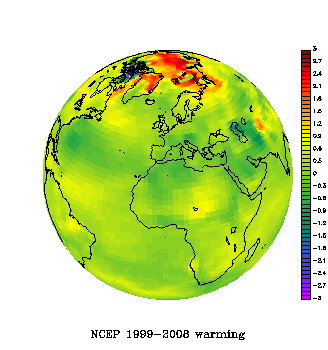At RealClimate, we have more than once been accused of being imbalanced — criticizing those who would deny the basic science of climate change, while leaving inflammatory statements by what might be called the “environmentalist side” without comment. It’s not an entirely a fair criticism, because there is a world of difference between the willful obfuscation of science and the naive exaggeration of it. There are however plenty of silly, and sometimes outrageous, claims made – see e.g. the Telegraph on Jan. 3rd — and we probably ought to do a better job of calling these out, particularly when they show up in prominent places. So to inaugurate the New Year, I humbly offer a rant about a minor but illustrative example that I happened to notice because there was a link to it on Nature Reports Climate Change.
The subject of the linked article, in the British online newspaper The Independent, is the decline of various bird and butterfly species in England. The article, entitled Changing climate devastates UK species, reports that “insects in particular, and creatures that feed on insects…were sharply reduced in numbers” due to a “cold late spring, a wet summer, with few sunny days, and the long dry autumn….” Now I have no reason to doubt the accuracy of the claim that 2008 was a hard year for UK insects and insectivores. But this is weather we’re talking about, not climate. And while it is true that at least one prominent study shows that there has been an overall increase in rainfall in the latitude band that includes the UK, and that climate models reproduce this trend (see e.g. the Zhang et al. article in Nature, in 2007), one cannot, as we are fond of pointing out, attribute a single, or even several individual extreme weather events to “climate change”.
Indeed, Peter Stott, a co-author on the Zhang et al. study noted, in reference to 2007 (the wettest summer on record in the UK) that “This latest study cannot make the link between climate change and what we have experienced so far this summer.” Moreover, most projections actually suggest drier summers in the UK in the future, though with increased convection (so less total precipitation, but bigger rainstorms).
Another thing that bugs me about the Independent article is the suggestion that climate is becoming “more unpredictable”. I suspect what is meant here is that we used to know what a mean season and normal variations were, and now we don’t. That’s valid, since the baseline climate is changing. But saying it this way — that “climate is becoming more unpredictable” is misleading. In fact, climate may, if anything, become more predictable as anthropogenic forcing becomes even more dominant (as greenhouse gas concentrations increase), relative to natural forcing and variability. And what is definitely not the case — but might be inferred from the article — is that weather is becoming more unpredictable. Weather prediction is based on observations just a few days in advance — climate and climate trends have nothing to do with it.
The point here is not that we shouldn’t be concerned about the fate of insects and birds in the UK (that would be the kind of conclusion that only the most willfully ignorant would draw.) They have been in decline for a long time (mostly due to land use change and pesticides) and there is little doubt that climate change will continue to add insult to injury. But it is simply wrong to confuse a year or even two years of unfavorable weather with a change in climate, and it is irresponsible to headline an article that is really about weather with the provocative juxtaposition of “climate” and “devastates”. Doing so gives the average reader the sense that their personal observations about “weird weather patterns” or fewer sightings of Parus caeruleus represent definitive manifestations of climate change. The fact is, climate changes are — so far — small enough in most places, relative to the natural variability, that one’s personal experience is a very poor guide to what is happening over the long term (observations of sea ice changes by those that live in the high Arctic notwithstanding).


 Browsing through the blogosphere recently, I came across an interesting little story about the scientific method, scientific progress, and un-scientific spin (h/t
Browsing through the blogosphere recently, I came across an interesting little story about the scientific method, scientific progress, and un-scientific spin (h/t 